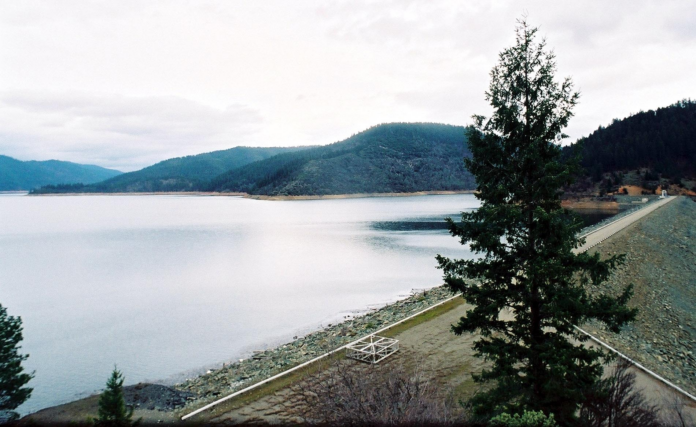FILE – Lewiston Dam on the Trinity River at Lewiston, Calif., is viewed March 12, 2003. On Monday Oct. 31, 2022, the Hoopa Valley Tribe sued the Biden Administration, alleging the federal government is violating the tribe’s sovereignty and failing to collet money for environmental damage on the river. (AP Photo/Jeff Barnard, File)
FILE – Lewiston Dam on the Trinity River at Lewiston, Calif., is viewed March 12, 2003. On Monday Oct. 31, 2022, the Hoopa Valley Tribe sued the Biden Administration, alleging the federal government is violating the tribe’s sovereignty and failing to collet money for environmental damage on the river. (AP Photo/Jeff Barnard, File)
SACRAMENTO, Calif. (AP) — The Hoopa Valley Tribe alleged in a lawsuit Monday that the federal government is violating its sovereignty and failing to collect money from California farms that rely on federally supplied water to pay for damages to tribal fisheries.
The tribe, which has a reservation in northwest California, says in its lawsuit against the Biden administration that the Trinity River that it relies on for food and cultural purposes has been decimated by decades of the federal government diverting water.
The suit alleges the U.S. Department of the Interior has failed to follow laws that require the contractors who use that water to pay money for habitat restoration projects. It says those contractors owe $340 million for environmental restoration work along the Trinity River and other places damaged by water diversions.
“The river has become a place that is no longer a healing place, but a place that is a sick place,” said Jill Sherman-Warne, a member of the Hoopa tribal council.
ADVERTISEMENT
The suit also alleges that the federal government has failed to appropriately consult with the tribe on matters related to the river.
The Interior Department declined to comment through spokesman Tyler Cherry.
Since the 1950s, the Trinity River has been a major source of water for the Central Valley Project, a system of dams, reservoirs and canals that sends water south to farmers who harvest fruits, nuts and other crops. Fish that swim through the river include the coho salmon, which is listed as an endangered species. Twelve miles of the river flow through the tribe’s reservation.
Congress updated laws governing the water project’s operation in 1992. It gave the tribe some power to concur over changes to river flows, added requirements for protecting fish in the Trinity River, and stated any renewals of long-term water contracts had to follow existing laws.
At the end of the Obama administration, Congress passed a law saying that any temporary federal contracts for water could be turned into permanent ones if they pay back the federal government for certain costs. Previously, the contracts had to be reapproved on a regular basis.
Westlands Water District, the nation’s largest agricultural water district, was one of the contractors that converted its water contract to a permanent one. The new agreement doesn’t grant Westlands any additional water or promise that it will get everything in dry years, but it effectively gives the district a contract for water in perpetuity.
ADVERTISEMENT
The deal was controversial because David Bernhardt, a former Westlands lobbyist, was interior secretary when the contract was approved and a judge later declined to validate it. But Westlands and the federal government are still moving forward with it, Westlands spokeswoman Shelley Cartwright said. The district has rejected claims it received special treatment.
The suit alleges the contract fails to include requirements for habitat restoration payments. As Bernhardt left office, he wrote a memo agreeing with staff recommendations that most environmental mitigation work related to the Central Valley Project was complete.
ADVERTISEMENT
Daniel Cordalis, deputy solicitor for water resources in Biden’s Interior Department, later rescinded that decision. But the tribes allege the money has still not been paid. Cherry, the interior spokesman, didn’t respond to an email asking for the department’s current position on whether the work is done.
Tribal leaders, though, say restoration work is far from complete and that the river is in dire need of help.
“An integral part of the life here is the Trinity River. That changed dramatically in the 1950s when Congress chose to dam up the river,” said Mike Orcutt, fisheries director for the Hoopa Valley Tribe. “We’ve been fighting for decades to right that wrong.”
Cartwright, the Westlands’ spokeswoman, said the district pays a set fee to a restoration fund based on how much water it receives. She said in an email that the contract “provides for the payment of money, consistent with federal law.”
ADVERTISEMENT
The tribe initially sued during the Trump administration but later put the lawsuit on hold and hoped to settle with the Biden administration. The current interior secretary is Deb Haaland, a member of the Pueblo of Laguna Tribe and the first Native American to hold a cabinet position. Tribal officials chose to renew the lawsuit because the Biden administration has not changed course, leaders said.
__
This story has been updated to say Westlands Water District has a permanent contract for water, not a permanent right. It has also been corrected to say the tribe previously put the lawsuit on hold.
Hoopa Valley Tribe sues US over California water contracts
RELATED ARTICLES


